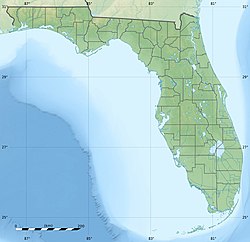"The House That Bobby Built" | |
 Stadium entrance | |
| Location | 403 Stadium Drive West, Tallahassee, Florida 32306, United States |
|---|---|
| Coordinates | 30°26′17″N 84°18′16″W / 30.43806°N 84.30444°W |
| Operator | Florida State Athletics |
| Capacity | 50,000 (2024)[1]
Former capacity List
|
| Record attendance | 84,431 (October 18, 2014) |
| Surface | 419 Tifway Bermuda Grass[2] |
| Construction | |
| Broke ground | June 1950 |
| Opened | October 7, 1950 |
| Expanded | 1954, 1961, 1964, 1977, 1980, 1982, 1985, 1992–1996, 2001, 2003, 2016 |
| Construction cost | $250,000 (in 1950) ($3.17 million in 2023 dollars[3]) |
| Architect | Ball-Horton & Associates[4] Barnett Fronczak Architects The Architects Collaborative (Renovations) |
| General contractor | Jack Culpepper Construction Co.[5] |
| Tenants | |
| Florida State Seminoles football (NCAA FBS) (1950-present) Florida A&M Rattlers football (NCAA FCS) (1974-80) | |
| Website | |
| seminoles.com/doakcampbellstadium | |
Doak S. Campbell Stadium (in full Bobby Bowden Field at Doak S. Campbell Stadium), popularly known as "Doak", is a football stadium on the campus of Florida State University in Tallahassee, Florida, United States. It is the home field of the Florida State Seminoles football team of the Atlantic Coast Conference (ACC).
Opened in 1950, it was originally named Doak Campbell Stadium in honor of Doak S. Campbell, the university's first president. On November 20, 2004, the Florida Legislature added longtime head football coach Bobby Bowden to the stadium name to become Bobby Bowden Field at Doak Campbell Stadium.[6] A petition in June 2020 sought to remove Campbell's name, as he resisted racial integration while president of Florida State University.[7][8] FSU President John E. Thrasher asked Athletics Director David Coburn "to immediately review this issue and make recommendations to me."[9] As of June 2022, no recommendations have been made.
The stadium is part of the University Center complex, a mixed-use facility encompassing university office space, university classrooms, the university's Visitor Center, souvenir store, The University Center Club, now known as the Dunlap Champions Club, and skyboxes and press boxes for use during football games.
With a capacity of 79,560, it is the 49th-largest stadium in the world, the second-largest stadium in the Atlantic Coast Conference, and the 15th largest stadium in the NCAA.[10]
- ^ "TheOsceola - FSU athletics, Seminole Boosters detail Doak upgrades, 2024 seat changes". floridastate.rivals.com. 2023-09-15. Retrieved 2023-10-27.
- ^ "Bobby Bowden Field at Doak S. Campbell Stadium". Florida State University. 2018. Retrieved January 7, 2018.
- ^ 1634–1699: McCusker, J. J. (1997). How Much Is That in Real Money? A Historical Price Index for Use as a Deflator of Money Values in the Economy of the United States: Addenda et Corrigenda (PDF). American Antiquarian Society. 1700–1799: McCusker, J. J. (1992). How Much Is That in Real Money? A Historical Price Index for Use as a Deflator of Money Values in the Economy of the United States (PDF). American Antiquarian Society. 1800–present: Federal Reserve Bank of Minneapolis. "Consumer Price Index (estimate) 1800–". Retrieved February 29, 2024.
- ^ "Speed in Fifty-Year Plan Seen in Building Progress". Florida Flambeau. June 2, 1951. Retrieved September 3, 2012.
- ^ Sessions, Montrell (October 6, 1950). "3-Year Old FSU Dream Realized With Stadium". Florida Flambeau. p. 2. Retrieved September 12, 2018.
- ^ "FSU To Dedicate Window, Field In Honor Of Legendary Coach Bowden" (Press release). Atlantic Coast Conference. November 17, 2004. Archived from the original on April 4, 2012. Retrieved October 28, 2009.
- ^ "FSU to review changing football stadium's name". ESPN.com. 2020-06-22. Retrieved 2020-06-28.
- ^ "FSU Head is in Quandary Over How to Ban Student Support of Integration | fsu.digital.flvc.org". fsu.digital.flvc.org. Retrieved 2020-06-28.
- ^ "As Doak Campbell Stadium name comes under fire, FSU president says university will study issue". USA Today. June 22, 2020. Archived from the original on 2020-06-24. Retrieved 2020-06-24.
- ^ Dowell, Stephen M. (September 12, 2011). "FSU Football: Behind the Scenes at Doak Campbell Stadium". Orlando Sentinel. Retrieved September 12, 2018.

